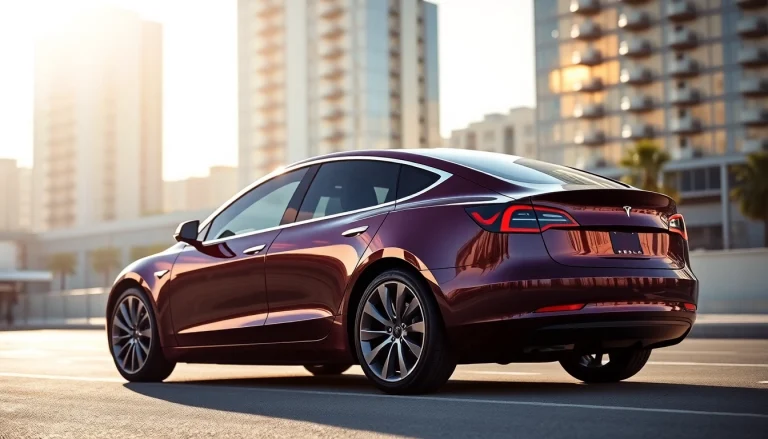
Understanding What Makes the Perfect Car
Finding the perfect car can often feel like an overwhelming journey. Each person has unique preferences, desires, and needs when it comes to automobiles. While some may prioritize performance and speed, others may favor safety and technology. This section aims to dissect the idea of what constitutes a perfect car by analyzing essential features and personal preferences.
The Essential Features of a Perfect Car
The definition of a perfect car can vary significantly from one individual to another. However, several core features are often highlighted as critical components:
- Reliability: A perfect car should be dependable. This means minimal breakdowns and a trustworthy performance, which is essential for peace of mind.
- Fuel Efficiency: As fuel prices rise, the demand for fuel-efficient vehicles increases. A perfect car would ideally balance power and efficiency, offering drivers the best of both worlds.
- Safety Features: Advanced safety technologies such as lane assist, automatic emergency braking, and adaptive cruise control are increasingly sought after, especially for family-oriented vehicles.
- Comfort and Interior Quality: Comfort enhances the driving experience, particularly for those who spend considerable time on the road. Leather seating, climate control, and ergonomic design are desirable qualities.
- Technology and Connectivity: Modern buyers often look for vehicles equipped with state-of-the-art technology. Infotainment systems, smartphone integration, and navigation features are now viewed as essential.
- Resale Value: A vehicle that holds its value well is a significant factor for many buyers, combining the attraction of luxury with long-term financial wisdom.
Identifying Personal Preferences in Vehicle Selection
To identify one’s ideal vehicle, it’s crucial to assess personal needs and preferences. Here are some questions one might consider:
- What will be the primary use of the vehicle (daily commuting, family transport, etc.)?
- Do you need a spacious vehicle, or would a compact model suffice?
- Which features are absolutely necessary versus those that are nice to have?
- What is your preferred driving experience (sporty, smooth, rugged)?
- How important is technology and advanced connectivity to you?
Answering these questions can help clarify what the perfect car looks like for each buyer and guide them toward making an informed decision.
Assessing Performance vs. Aesthetics
When discussing the perfect car, the balance between performance and aesthetics often comes up. Performance encompasses speed, handling, and overall driving experience, while aesthetics considers design, color, and the vehicle’s visual appeal.
For example, sports cars like the Ferrari or Lamborghini emphasize performance and stunning looks but may lack practicality for everyday use. Conversely, family-oriented SUVs focus on functionality and space but can sometimes compromise on styling.
Ultimately, the choice lies in personal preference. Some may find the thrill of towing a trailer with a rugged truck more appealing than cruising in style, while others may prioritize the sleekness of a metropolitan coupe over engine performance.
Steps to Finding Your Perfect Car
Setting a Realistic Budget for Your Ideal Vehicle
Budgeting is a crucial first step in the car-buying process. This budget should consider not only the purchase price but also insurance, maintenance, fuel, and taxes. An ideal approach to budgeting includes:
- Assessing your financial situation: Take stock of your income and regular expenses to ascertain how much you can comfortably spend monthly.
- Determining a research budget: Allocate funds toward researching your options, including potential test drives and consulting reliable reviews.
- Considering potential financing options: Many buyers choose to finance their vehicles, so understanding interest rates and loan terms is essential.
- Anticipating additional costs post-purchase: Budget for maintenance, insurance, fuel, and taxes to avoid financial surprises.
Doing this background work ensures that the chosen vehicle remains an asset rather than a financial burden.
Researching Various Car Types and Brands
With a budget in place, the next step involves diving deep into research. Here’s how to approach it:
- Online Resources: Websites like Edmunds, Kelley Blue Book, and Consumer Reports offer invaluable insights into vehicle performance, reliability, and safety ratings. They help compare various models within your budget.
- Personal Recommendations: Friends and family often have valuable experience with different brands, which can provide insight into hidden gems or potential pitfalls.
- Visit Dealerships: Physically inspecting cars and taking test drives can help gauge comfort levels and suitability. Check if the dealership offers any Certified Pre-Owned options.
Researching current automotive trends can also affect car choices, especially as more manufacturers embrace technology, fuel efficiency, and electric vehicles (EVs).
Utilizing Online Tools to Narrow Your Options
In the digital age, various online tools can aid in finding the perfect car. Websites that allow users to filter options based on preferences are invaluable. For example:
- Car Finder Tools: Platforms like Kelley Blue Book provide features that allow users to filter by price, make, model, and essential features, helping to quickly narrow down choices.
- Comparison Tools: Utilize comparison tools available on automotive sites to evaluate multiple cars side by side, making it easier to weigh pros and cons at a glance.
- User Review Platforms: Access reviews from previous buyers to acquire real-world experiences that may not be reflected in professional reviews.
By leveraging these tools, buyers can make informed decisions and uncover options they might not initially consider.
Evaluating the Perfect Car for Different Needs
Family-Friendly Cars: Safety and Space Considerations
Families prioritize safety and space when seeking the perfect vehicle. Characteristics to consider when evaluating family-friendly cars include:
- Crash-Test Ratings: Review ratings from organizations like the National Highway Traffic Safety Administration (NHTSA) and the Insurance Institute for Highway Safety (IIHS). These assessments are pivotal when prioritizing safety.
- Interior Space: Consider the capacity of the vehicle to accommodate passengers and cargo. SUVs and minivans are often ideal due to their spacious interiors.
- Child Safety Features: Look for cars that come with integrated child seat anchors and rear passenger doors designed for easy access.
- Entertainment Systems: Vehicles with entertainment features can keep children occupied during long drives, ensuring a more pleasant experience for all passengers.
A survey of popular family vehicles reveals offerings such as the Honda Odyssey, Toyota Sienna, and Ford Explorer often topping the lists due to their safety and space attributes.
Fuel Efficiency for Daily Commuters
For daily commuters, fuel efficiency is a significant concern. A perfect car for this demographic minimizes costs while maximizing utility. Consider the following points:
- Hybrid or Electric Options: As technology advances, hybrid and fully electric vehicles present significant benefits in terms of fuel economy. Models like the Toyota Prius or Tesla Model 3 are great examples of efficient options.
- Compact Models: Smaller cars typically achieve better fuel economy, making them suitable for urban driving where traffic and stop-and-go conditions are common.
- Real-World Mileage Estimates: Compare observed mileage from real users rather than solely relying on manufacturer claims to get an accurate picture of a vehicle’s fuel efficiency.
Investing in a fuel-efficient vehicle can save significant money over time, making it easier to justify the initial purchase.
Performance Vehicles for Enthusiasts
Car enthusiasts often view performance as the holy grail of vehicle selection. Factors that influence their choice of the perfect car include:
- Engine Power: Cars with high horsepower and torque provide thrilling acceleration and driving experiences. For instance, the Ford Mustang and Chevrolet Camaro are popular choices among enthusiasts.
- Handling and Response: Performance isn’t just about speed; it’s also about how a car responds during sharp turns and varying road conditions. Cars known for excellent handling, like the Mazda MX-5 Miata, can often be more enjoyable to drive.
- Aerodynamics: The design’s impact on speed and efficiency is vital. A well-designed car can cut through the wind better, resulting in enhanced performance.
- Customization Opportunities: Enthusiasts enjoy personalizing their vehicles. Access to customization parts and support from communities can enhance a vehicle’s performance and aesthetics.
The choice of models often comes down to personal taste, but it’s clear that performance vehicles require thoughtful consideration of various components to ensure satisfaction.
Where to Buy Your Perfect Car
Comparing Dealerships and Private Sellers
When it comes to purchasing a vehicle, buyers have the choice of various sources, including dealerships and private sellers. Evaluating these options is essential:
- Trustworthiness: Dealerships often offer warranties and certified pre-owned vehicles, which can provide peace of mind. In contrast, private sellers may offer lower prices but lack such protections.
- Inventory Variety: Dealerships typically have a more extensive range of vehicles available, including new and certified pre-owned options. This can make it easier to find the perfect car in one stop.
- Negotiation Flexibility: Private sales may provide more room for negotiation. However, whether buying from a dealer or a private seller, knowing the market value can strengthen your bargaining position.
Thorough research and preparation before venturing into negotiations can ensure you secure the best deal, regardless of the seller type.
Understanding the Benefits of Certified Pre-Owned Vehicles
While many buyers aspire to own a new car, the certified pre-owned (CPO) market offers enticing benefits. Here’s why considering a CPO vehicle may be advantageous:
- Quality Assurance: CPO vehicles undergo rigorous inspections, ensuring that they meet specific manufacturer standards. Buyers can enjoy quality similar to that of new vehicles at a reduced price.
- Extended Warranties: Most CPO vehicles come with extended warranties, providing additional protection and assurance that might not be available with private sellers.
- Depreciation Spike Avoidance: New cars depreciate the moment they are driven off the lot. CPO vehicles typically incur less depreciation value, making them a financially sound investment.
Exploring CPO options can significantly enhance your chances of finding the perfect car that meets both your needs and budget.
Negotiation Tips to Secure Your Ideal Price
Once you’ve identified the perfect car, the next step is mastering the art of negotiation. Here are some strategies:
- Patient Research: Research the market value of the car you want to buy. Knowledge is power, and understanding the fair price will aid negotiations.
- Stay Calm: Keep emotions in check during negotiations. Stay composed and focused on securing the best deal without showing desperation.
- Be Prepared to Walk Away: If the deal doesn’t meet your expectations, be ready to walk away. This shows the seller you are serious and will prevent you from rushing into a poor decision.
Effective negotiation can lead to significant savings, enhancing your financial investment in your chosen vehicle.
After Purchase: Ensuring Your Perfect Car Remains in Optimal Condition
Routine Maintenance Tips for Longevity
After acquiring your perfect car, proper maintenance becomes essential to ensure longevity and performance. Consider the following maintenance tips:
- Regular Oil Changes: Follow the manufacturer’s guidelines for oil changes to keep the engine in ideal condition. This is one of the most crucial steps in vehicle maintenance.
- Tire Care: Check tire pressure regularly and ensure timely rotations to extend tire life and maximize fuel efficiency.
- Brake Inspections: Pay attention to brake performance and have them inspected if any irregular sounds occur. Safe braking is crucial for vehicle safety.
- Filter Changes: Regularly check air and fuel filters. Clean filters contribute to optimal engine performance and fuel efficiency.
Taking proactive measures keeps your vehicle in prime condition, prolonging its lifespan and your satisfaction.
Customizing Your Car to Suit Your Style
Many car owners enjoy customizing their vehicles to reflect their styles. Options for customization include:
- Exterior Modifications: Upgrades such as new paint jobs, decals, and body kits can enhance both aesthetics and performance.
- Interior Enhancements: Consider custom seat covers, steering wheels, sound systems, and floor mats for a personalized touch.
- Performance Modifications: Upgrading exhaust systems, brakes, and suspension can improve performance while making your vehicle unique.
Customization offers a creative outlet for expressing individuality while potentially enhancing performance and comfort.
Joining Communities for Car Enthusiasts
Building connections with fellow car enthusiasts can substantially enrich the car ownership experience. Communities often provide:
- Shared Knowledge: Engage with others to learn about maintenance, modifications, or experiences with similar vehicles.
- Support Networks: Access to local meet-ups and events fosters a sense of belonging and camaraderie.
- Resources: Online forums and groups can provide guidance on issues ranging from troubleshooting to sourcing parts.
Active participation in car enthusiast communities can enhance one’s enjoyment and understanding of their vehicle, creating a fulfilling ownership experience.





